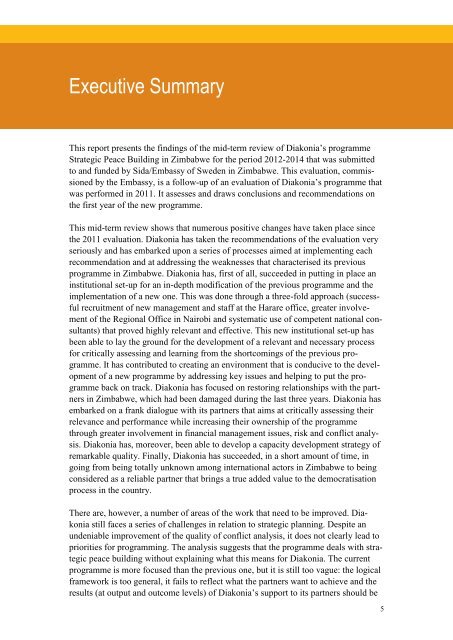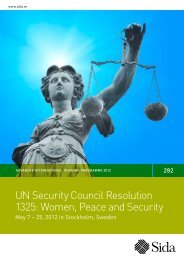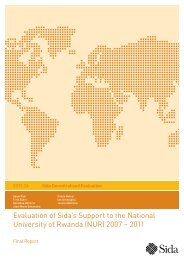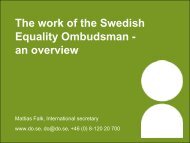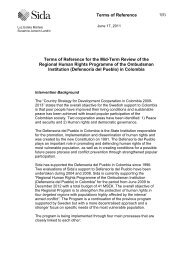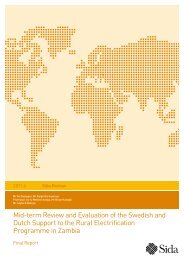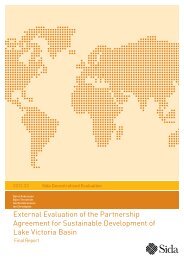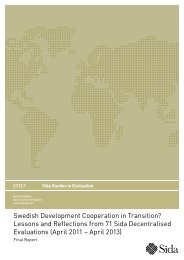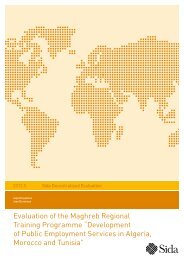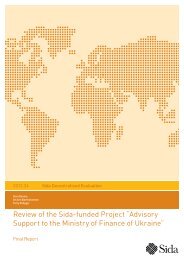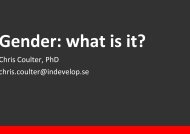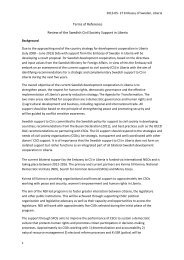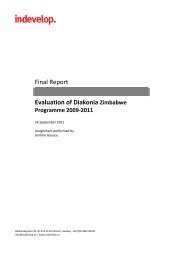Mid-term Review of the Diakonia Strategic Peace Building ... - Sida
Mid-term Review of the Diakonia Strategic Peace Building ... - Sida
Mid-term Review of the Diakonia Strategic Peace Building ... - Sida
Create successful ePaper yourself
Turn your PDF publications into a flip-book with our unique Google optimized e-Paper software.
Executive Summary<br />
This report presents <strong>the</strong> findings <strong>of</strong> <strong>the</strong> mid-<strong>term</strong> review <strong>of</strong> <strong>Diakonia</strong>’s programme<br />
<strong>Strategic</strong> <strong>Peace</strong> <strong>Building</strong> in Zimbabwe for <strong>the</strong> period 2012-2014 that was submitted<br />
to and funded by <strong>Sida</strong>/Embassy <strong>of</strong> Sweden in Zimbabwe. This evaluation, commissioned<br />
by <strong>the</strong> Embassy, is a follow-up <strong>of</strong> an evaluation <strong>of</strong> <strong>Diakonia</strong>’s programme that<br />
was performed in 2011. It assesses and draws conclusions and recommendations on<br />
<strong>the</strong> first year <strong>of</strong> <strong>the</strong> new programme.<br />
This mid-<strong>term</strong> review shows that numerous positive changes have taken place since<br />
<strong>the</strong> 2011 evaluation. <strong>Diakonia</strong> has taken <strong>the</strong> recommendations <strong>of</strong> <strong>the</strong> evaluation very<br />
seriously and has embarked upon a series <strong>of</strong> processes aimed at implementing each<br />
recommendation and at addressing <strong>the</strong> weaknesses that characterised its previous<br />
programme in Zimbabwe. <strong>Diakonia</strong> has, first <strong>of</strong> all, succeeded in putting in place an<br />
institutional set-up for an in-depth modification <strong>of</strong> <strong>the</strong> previous programme and <strong>the</strong><br />
implementation <strong>of</strong> a new one. This was done through a three-fold approach (successful<br />
recruitment <strong>of</strong> new management and staff at <strong>the</strong> Harare <strong>of</strong>fice, greater involvement<br />
<strong>of</strong> <strong>the</strong> Regional Office in Nairobi and systematic use <strong>of</strong> competent national consultants)<br />
that proved highly relevant and effective. This new institutional set-up has<br />
been able to lay <strong>the</strong> ground for <strong>the</strong> development <strong>of</strong> a relevant and necessary process<br />
for critically assessing and learning from <strong>the</strong> shortcomings <strong>of</strong> <strong>the</strong> previous programme.<br />
It has contributed to creating an environment that is conducive to <strong>the</strong> development<br />
<strong>of</strong> a new programme by addressing key issues and helping to put <strong>the</strong> programme<br />
back on track. <strong>Diakonia</strong> has focused on restoring relationships with <strong>the</strong> partners<br />
in Zimbabwe, which had been damaged during <strong>the</strong> last three years. <strong>Diakonia</strong> has<br />
embarked on a frank dialogue with its partners that aims at critically assessing <strong>the</strong>ir<br />
relevance and performance while increasing <strong>the</strong>ir ownership <strong>of</strong> <strong>the</strong> programme<br />
through greater involvement in financial management issues, risk and conflict analysis.<br />
<strong>Diakonia</strong> has, moreover, been able to develop a capacity development strategy <strong>of</strong><br />
remarkable quality. Finally, <strong>Diakonia</strong> has succeeded, in a short amount <strong>of</strong> time, in<br />
going from being totally unknown among international actors in Zimbabwe to being<br />
considered as a reliable partner that brings a true added value to <strong>the</strong> democratisation<br />
process in <strong>the</strong> country.<br />
There are, however, a number <strong>of</strong> areas <strong>of</strong> <strong>the</strong> work that need to be improved. <strong>Diakonia</strong><br />
still faces a series <strong>of</strong> challenges in relation to strategic planning. Despite an<br />
undeniable improvement <strong>of</strong> <strong>the</strong> quality <strong>of</strong> conflict analysis, it does not clearly lead to<br />
priorities for programming. The analysis suggests that <strong>the</strong> programme deals with strategic<br />
peace building without explaining what this means for <strong>Diakonia</strong>. The current<br />
programme is more focused than <strong>the</strong> previous one, but it is still too vague: <strong>the</strong> logical<br />
framework is too general, it fails to reflect what <strong>the</strong> partners want to achieve and <strong>the</strong><br />
results (at output and outcome levels) <strong>of</strong> <strong>Diakonia</strong>’s support to its partners should be<br />
5


